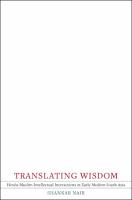Translating Wisdom
Hindu-Muslim Intellectual Interactions in Early Modern South Asia
Abstract
During the height of Muslim power in South Asia, Muslim nobles of the Mughal Empire (1526-1857) patronized the translation of a large body of Hindu Sanskrit texts into the Persian language, including the Upaniṣads, the Bhagavad Gītā, and numerous other works. In Translating Wisdom, Shankar Nair reconstructs the intellectual processes that underlay these translations, traversing an exceptional linguistic scope including Sanskrit, Arabic, and Persian materials. Using the 1597 Persian rendition of the Sanskrit Yoga Vāsiṣṭha as a case study, Nair traces the intellectual exchanges by which teams of Muslim and Hindu translators, working collaboratively and drawing upon their respective religio-philosophical traditions, crafted a novel lexicon with which to express Hindu philosophical wisdom in an Islamic Persian idiom. How did these translators find a vocabulary through which to convey Hindu, Sanskrit articulations of God, conceptions of salvation and the afterlife, Hindu ritual notions, etc., in Islamic Persian terms? How did these two communities of scholars devise a shared language with which to communicate and to render one another’s religious and philosophical views mutually comprehensible? Translating Wisdom illustrates how these early modern Muslim and Hindu scholars found the words and the means to put their traditions into conversation with one another, achieving a nuanced inter-religious and cross-philosophical dialogue significant not only to South Asia’s past, but also its present.
Keywords
Yoga Vāsiṣṭha; South Asia; translation; Indian philosophy; Hinduism; Islam; Sufism; Sanskrit; Arabic; PersianDOI
10.1525/luminos.87Publisher
University of California PressPublisher website
https://www.ucpress.edu/Publication date and place
Oakland, 2020Classification
Asian history
Religion: general


 Download
Download